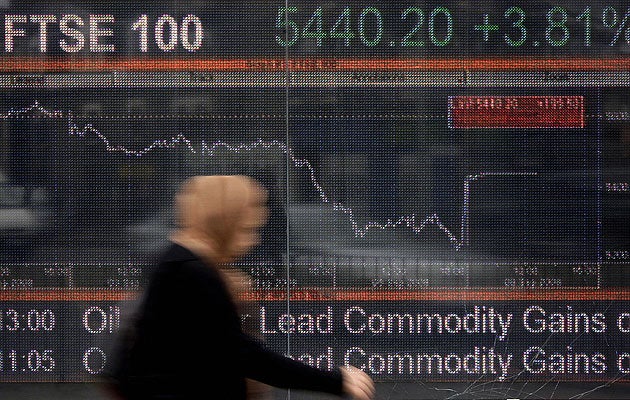FTSE 100 breaks three-day streak despite positive PMI data, Sensex slumps after RBI monetary policy
A host of positive economic data coming from the US caps losses in leading Wall Street indexes

London’s FTSE 100 snapped a three-day winning streak, dragged by mining stocks, while positive business data helped sustain the sentiment.
The blue-chip FTSE 100 closed 44 points or 0.6 per cent down, while the domestically focused FTSE 250 closed half a per cent down.
Retailer B&M Europe took a fall of 3.9 per cent while International Consolidated Airlines group was 5 per cent down.
The UK Purchasing Managers’ Index (PMI) data released on Thursday showed the biggest jump in service sector activity in 24 years last month. PMI rose to 62.9 in May from 61.0 in April, taking it to its highest point since May 1997 and above an initial estimate of 61.8.
Matthew Ryan, CFA, Senior Market Analyst at Ebury says the PMI figures show a “fairly sizable upward revision “ and provide “yet another indication that activity is rebounding strongly as lockdown measures in Britain are gradually unwound.”
“Macroeconomic data out of the UK has been resoundingly positive of late, and today’s data merely provides further evidence of that,” he said.
“Given the strength of the latest data, we are increasingly confident that we’ll see a strong rebound in the activity in the UK in the second and third quarters of the year at a faster pace than the rest of Europe, which has lagged a little way behind in removing lockdown measures.”
Across the pond, stocks closed lower on Wall Street, led by more declines in big technology companies while the positive economic data helped cap losses.
The Dow Jones Industrial Average closed off its low on Thursday to end the session near the flatline, down just 23 points, or less than 0.1 per cent at 34,577. The S&P 500 lost 0.4 per cent, and the Nasdaq Composite suffered a 1 per cent slide.
Data coming from the US showed the private job growth for May accelerated at its fastest pace in nearly a year, as payroll processing firm ADP’s report showed companies hired nearly a million workers.
Meanwhile, the latest jobless claims data came in slightly above estimates at 385,000, which is the first time that jobless claims fell below 400,000 since the early days of the pandemic.
Positive data from the US helped Asia-Pacific stocks open higher on Friday. Japan’s Nikkei, however, fell 0.8 per cent early in the session, recovering its losses a little by noon. MSCI’s broadest index of Asia-Pacific shares outside Japan was off 1.4 per cent. Chinese blue chips edged higher by 0.3 per cent.
Stocks at Hong Kong’s Hang Seng declined due to fears of increasing US-China tensions, as the leading index traded 0.4 per cent down.
President Joe Biden signed an executive order on Thursday that bans US entities from investing in a widened list of 59 Chinese companies with alleged ties to defence or surveillance technology sectors.
Indian indices opened flat earlier, and slumped lower after the country’s Reserve Bank announced its monetary policy on Friday morning. Sensex traded 0.3 per cent lower, while Nifty was 0.2 per cent down in the early hours of trade.
The Reserve Bank of India (RBI) has kept the repo rate unchanged at 4 per cent and the reverse repo rate unchanged at 3.35 per cent with an accommodative monetary policy stance. It gave a downward revision to the GDP forecast, projecting India’s real GDP to grow at 9.5 per cent in the financial year 2021-2022.
Join our commenting forum
Join thought-provoking conversations, follow other Independent readers and see their replies
Comments
Bookmark popover
Removed from bookmarks